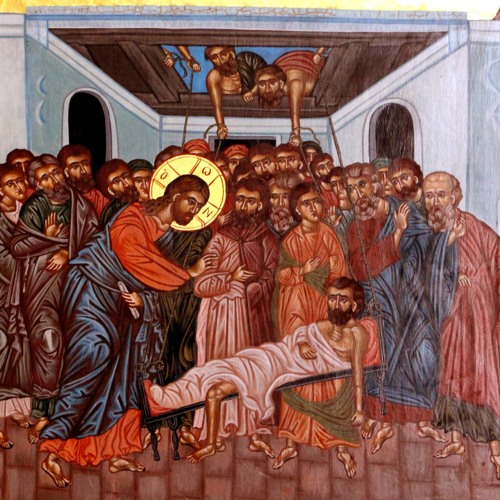DAILY MEDITATION: “Child, your sins are forgiven.” (...) “I say to you, rise, pick up your mat, and go home.”
Liturgical day: Friday of the First Week in Ordinary Time
 Gospel text (Mk 2,1-12): When Jesus returned to Capernaum after some days, it became known that he was at home. Many gathered together so that there was no longer room for them, not even around the door, and he preached the word to them.
Gospel text (Mk 2,1-12): When Jesus returned to Capernaum after some days, it became known that he was at home. Many gathered together so that there was no longer room for them, not even around the door, and he preached the word to them.
They came bringing to him a paralytic carried by four men. Unable to get near Jesus because of the crowd, they opened up the roof above him. After they had broken through, they let down the mat on which the paralytic was lying. When Jesus saw their faith, he said to the paralytic, “Child, your sins are forgiven.”
Now some of the scribes were sitting there asking themselves, “Why does this man speak that way? He is blaspheming. Who but God alone can forgive sins?”
Jesus immediately knew in his mind what they were thinking to themselves, so he said, “Why are you thinking such things in your hearts? Which is easier, to say to the paralytic, ‘Your sins are forgiven,’ or to say, ‘Rise, pick up your mat and walk’? But that you may know that the Son of Man has authority to forgive sins on earth”— he said to the paralytic, “I say to you, rise, pick up your mat, and go home.”
He rose, picked up his mat at once, and went away in the sight of everyone. They were all astounded and glorified God, saying, “We have never seen anything like this.”
“Child, your sins are forgiven.” (...) “I say to you, rise, pick up your mat, and go home.”
Fr. Joan Carles MONTSERRAT i Pulido
(Cerdanyola del Vallès, Barcelona, Spain)
Today, we see the Lord surrounded once more by crowds: “Many gathered together so that there was no longer room for them, not even around the door” (Mk 2, 2). His heart is melted by people's needs and provides them as much relief as possible; by forgiving, teaching and healing them at the same time. He certainly offers them physical help (as in today's parable, by curing the paralytic), but —actually— He is looking for the very best for each one of us: the well-being of our soul.
Jesus, our Savior, wants to give us a true hope of salvation. He even forgives our sins and sympathizes with our moral feebleness. Before anything else, He most emphatically says: “Child, your sins are forgiven.” (Mk 2, 5). Later on, we are given to see Him connecting the remission of our sins —which He generously and tirelessly grants— to a most extraordinary miracle, seen by our very eyes. After forgiving the paralytic’s sins He cures his paralysis, as a kind of external guarantee to open our eyes of faith: “’I say to you, rise, pick up your mat, and go home.’ He rose, picked up his mat at once, and went away in the sight of everyone” (Mk 2,11-12).
We can revive this miracle quite often through Confession. With the words of forgiveness said by the minister of God (“I absolve you from your sins in the name of the Father, and of the Son and of the Holy Spirit”) Jesus discreetly offers us the external guarantee of remission of our sins once more, a guarantee that is tantamount to the spectacular cure of the paralytic of Capernaum.
We are now beginning a new ordinary time. And, we believers are now reminded of the urgent need we have of a sincere and personal encounter with Jesus Christ, the All-Merciful Lord. In this liturgical time, He urges us neither to slacken our pace nor to neglect the necessary forgiveness He offers all of us in His dwelling, the Church.
Source: evangeli.net
